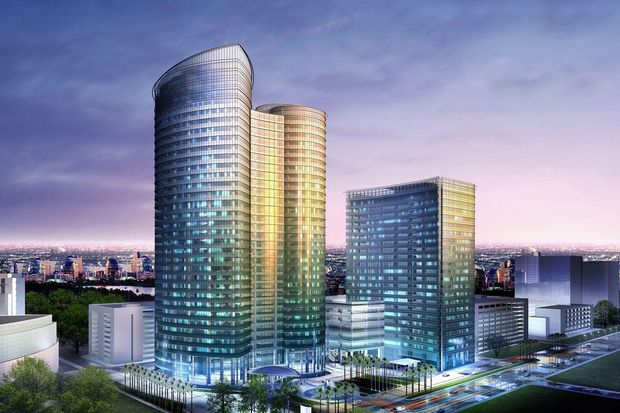
In 2010, PTT and the Ministry of Energy moved into The Energy Complex, a brand new state-of-the-art 300,000-square-metre office complex. The structure was Bangkok's first new LEED-certified green building, achieving the top-level Platinum certification.
In the six years since, the number of new LEED-certified office buildings in Bangkok has risen to ten, while dozens of other projects, including existing building retrofits, new office and retail shop interiors, and industrial properties have also received LEED certification.
Local developers, investors, corporate occupiers and retail brands are increasingly "going green" and all signs point towards increased adoption of global green building standards.
What is a green building?
Green buildings are those that are designed, either as new projects, or retrofits, to reduce energy and water use, as well as waste generation, to create healthier indoor environments, and to support broader sustainability objectives or policies and organisation may have.
The global standard in green building certification is LEED, which stands for "Leadership in Energy and Environmental Design". The LEED certification programme was established by the US Green Building Council (USGBC) in the mid-1990s and over the last two decades, many countries around the world, including Thailand, have followed suit and established their own green building standards. Examples include TREES (Thailand), BCA Green Mark (Singapore), BREEAM (UK), and Green Star (Australia).
Buildings that seek LEED-certification are evaluated on more than 100 individual metrics including energy usage, water efficiency, indoor air and environmental quality, innovation, location and building materials.
Certifications are awarded based on how well a project scores on the aforementioned metrics, with Platinum being the "greenest" or highest-scoring award, followed by Gold, Silver and Certified.
Who is going green in Bangkok and why?
Large Thai domestic firms are serving as trendsetters for the wider office market in Bangkok. On the development side, Univentures Plc and Goldenland Development Plc, firms associated with Charoen Sirivadhanabhakdi, have brought three world-class, LEED-certified office buildings to the market since 2011 -- Park Ventures Eco-Plex (Platinum), Sathorn Square (Gold), and FYI Center (Gold).
For these three projects LEED-certification was chosen over the local TREES scheme because multinational occupiers and investors recognise LEED as the global standard, elevating the projects above the competition.
"We feel that LEED certification is essential to attracting and retaining top blue-chip organsiations like Google, Stanford University, Canon, and Mizuho Bank," says Urasate Navanugraha, managing director of Univentures REIT Management, manager of the uber-successful Golden Ventures REIT that has acquired both Park Ventures Eco-Plex and Sathorn Square.
On the corporate side, Kasikornbank (KBank) and the Siam Cement Group (SCG) have embraced green building and made it a centrepiece of their corporate ethos.
KBank were recently awarded LEED Platinum certification for their Business Technology Group's new headquarters in Nonthaburi. This latest certification follows a Gold award for KBank's Phahon Yothin Road head office (2011) and a Gold award for its learning centre in Chachoengsao province (2013).
In 2012, SCG retrofitted three existing buildings at its Bang Sue complex and were subsequently awarded Gold certification. In 2014, SCG's new "100th Anniversary" building at Bang Sue received a Platinum certification.
Investors and companies in Thailand are going green to support corporate social responsibility (CSR) objectives, to attract top talent (companies) and top occupiers (investors) who value a healthy and sustainable workplace, and to enhance the value of an asset by providing a higher-quality, "future-proofed" product.
At the same time, many occupiers from Europe and the US have sought LEED certification for their office interiors, in large part to conform to global corporate policies concerning sustainability, employee well-being, and CSR.
Citibank was the first large multinational to received LEED Gold certification for its new office interior (2011), followed by the United States Agency for International Development (USAID, 2011) and Unilever (2016).
Large multinational occupiers like Krungthai-AXA Insurance which are now relocating to new projects and leaving behind spaces that they have occupied for a decade or more are actively seeking LEED certification, a trend JLL expects to prevail.
Will the momentum continue?
Green buildings, including those with LEED, TREES, and BCA Green Mark certifications currently account for about 5% of market-wide office stock in Bangkok.
JLL is currently tracking more than 40 potential future office projects across the market, 25% of which have already submitted designs to the USGBC for LEED consideration.
In addition, JLL expects that at least an additional 30% of this future supply will achieve some form of green certification, based on publicly announced intentions by investors. This means more than half of the city's known future supply should be green.
Andrew Gulbrandson (www.linkedin.com/in/andrewgulbrandson) is the Head of Research and Consulting at JLL Thailand (http://www.jll.co.th/thailand/en-gb)